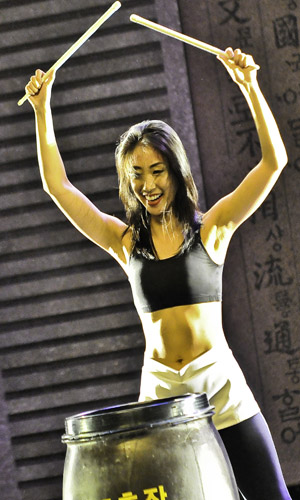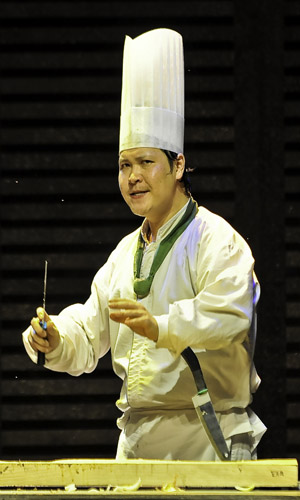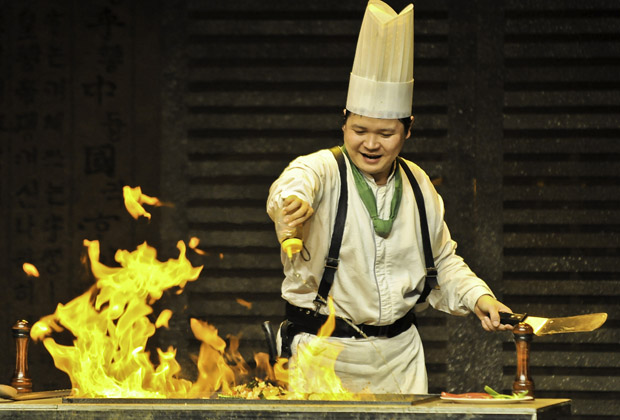Non-stop action marks long-running performance
 | ||
| ▲ The high energy live show NANTA is a favorite among locals and tourists. Photos by Brian Miller | ||
When visitors come to Jeju, there are many tourist attractions that locals recommend. Most of them are naturally beautiful spots on the island, but there is one indoor performance that has entertained visitors and locals alike for years.
NANTA, or “Cookin'” as its billed as in America, is most often described as the Korean STOMP!, a popular Broadway show started in the 1990's featuring the use of ordinary objects like garbage cans and lighters to create a percussive dance show.
But while STOMP is a series of dance pieces with no story or characters, NANTA has well defined characters and a clear plot. NANTA is not a dance show, but rather a movement show which seamlessly incorporates comedy bits, audience participation, and acrobatic spectacle as well as a variety of percussion numbers using cooking utensils.
The story follows a team of chefs who must prepare a wedding banquet on short notice. The manager brings in his inexperienced nephew to assist the crew. The kitchen then explodes to life as the preparation of each dish brings new challenges, new opportunities for comedy and ways for the characters to fool around making music in the kitchen. The story culminates in a spectacular “Three Drum Dance” where the drummers play standing kitchen ware drums amid extravagant theatrical lighting.
 | ||
Salmulnori requires four instruments: Kkwaenggwari (a small gong), Jing (a larger gong), Janggu (an hourglass-shaped drum), and Buk (a barrel drum). In NANTA, the four instruments are each represented by one of the four main characters. NANTA evolves the traditional theatrical form for the modern age.
One of the unique and creative aspects of NANTA is that there is very little dialog, but the few words present are spoken in English or animated gibberish which is easily understandable. The whole play is visual so an international audience without a common language can comprehend the story. According to NANTA's records, over 80 percent of the total audience members are foreign visitors.
The cross cultural accessibility of the show has lead to international success. NANTA had its debut performance on October 10, 1997. At the Edinburgh Fringe Festival in Scotland in 1999, the show opened internationally to sold out houses and won an award for best performance.
The NANTA Theatre was constructed in Seoul in 2000, the first theatre ever built in Korea specifically for one show. In 2004, it became the first Asian show to ever open off-Broadway and enjoyed a year and a half run in New York. Recently, the NANTA Theatre in Seoul was remodeled with a larger stage and room to accommodate more audience members. Now in its twelfth year, NANTA continues to be a top attraction for visitors to Korea and Jeju.
 | ||
The current Jeju performers are “The White Team”, one of seven casts that rotate between Jeju, two locations in Seoul, and an ongoing international tour to 212 cities in 27 countries. The performers are Moon Soo Kim as The Manager, Dae Hee Koon as the Head Chef, Yu Kyong Hwang as Hot Sauce, Min Goo Jung as Sexy Guy, and Sung Jin Min as Nephew.
NANTA runs in Jeju six days a week at the Jeju Media Center in Sammu Park, near the KAL Hotel, at 8 p.m. with a Saturday matinee at 4 p.m. For more information call 064-723-8878.
| ⓒ Jeju Weekly 2009 (http://www.jejuweekly.com) |

